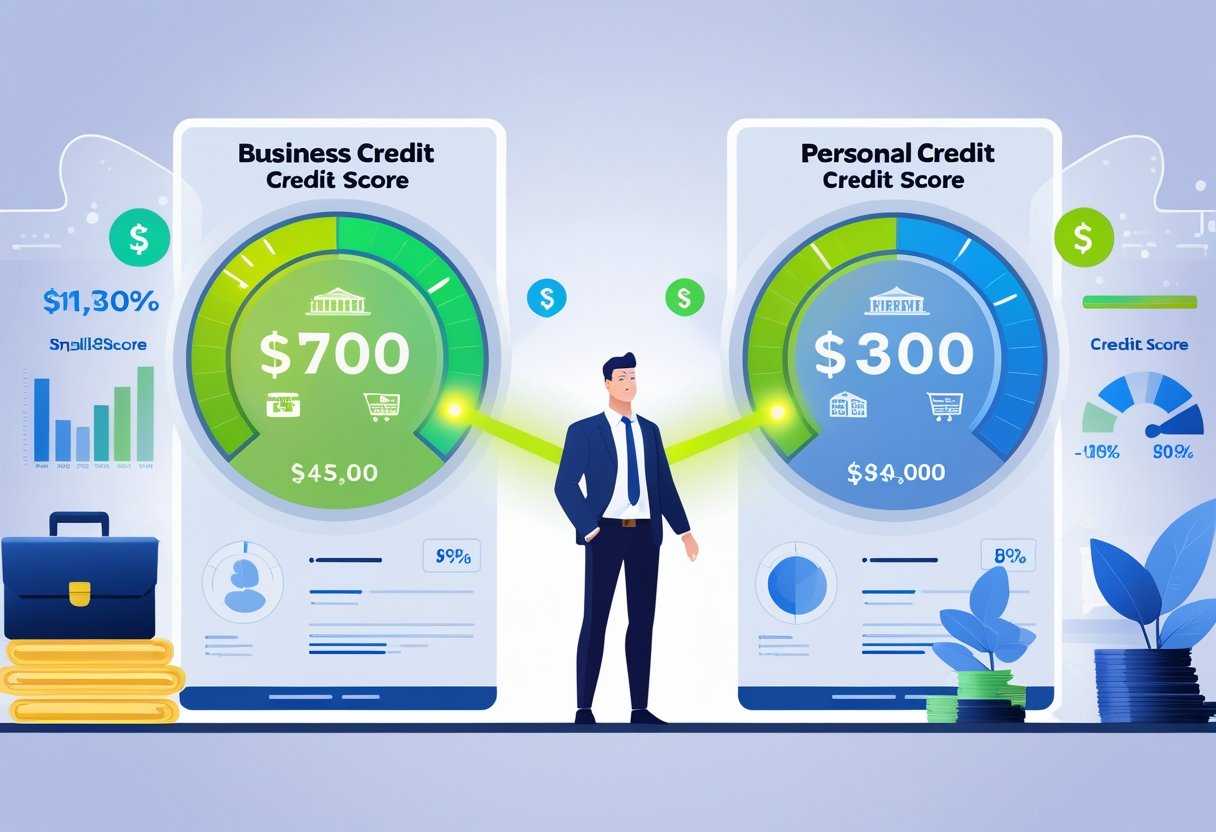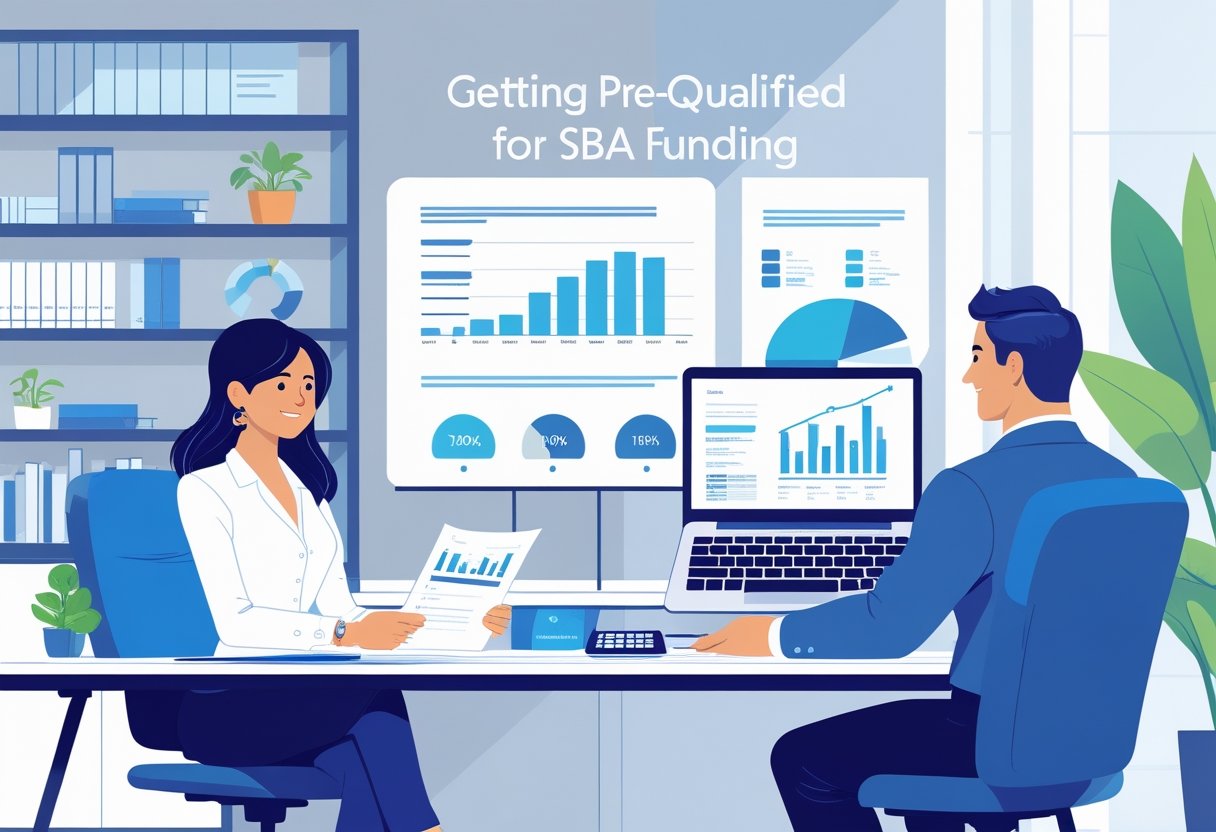
How To Improve Credit Before Applying For SBA Loan: Essential Strategies For Success
Improving your credit score is a vital step before applying for an SBA loan. Taking proactive steps to boost your credit can significantly enhance your chances of approval and secure better loan terms. Understanding how lenders evaluate credit will help you identify areas for improvement, such as paying down debt, addressing errors on your credit report, and consistently making payments on time.
At SBA Central, you have access to a comprehensive resource library designed specifically for SBA-related services. You can find tools, information, podcasts, and videos that offer guidance on securing your loan. Our unique combination of staffing solutions and consulting expertise sets us apart, making us the best choice for navigating the SBA loan process.
By focusing on your credit health now, you position yourself for success when approaching lenders. You’ll discover that even small changes can yield positive results, paving the way for the funding your business needs to thrive.
Understanding SBA Loans and Credit Basics
Understanding the connection between SBA loans and credit is crucial when seeking financing for your small business. Comprehending what SBA loans are, how credit influences approval, and the differences between personal and business credit scores can help you make informed decisions.
What Are SBA Loans?
SBA loans are made possible through the Small Business Administration, designed to assist small businesses in obtaining financing. These loans are partially guaranteed by the SBA, which reduces the risk for lenders. This backing allows for lower down payments and longer repayment terms compared to traditional loans.
The typical SBA loan includes options like the 7(a) loan, which is versatile for various business needs, and the CDC/504 loan, aimed at real estate and equipment purchases. Eligibility typically requires a solid business plan, detailed financial statements, and a focus on personal credit scores.
The Role of Credit in SBA Loan Approval
Your credit score is a key factor in the SBA loan approval process. It reflects your financial history and ability to repay debt, directly influencing lenders’ decisions. A strong personal credit score can improve your chances of loan approval and potentially secure you better interest rates.
Generally, a personal credit score of 680 or higher is favorable. If your score is below this threshold, address any outstanding debts, make timely payments, and reduce credit utilization. Improving your credit scores before applying can effectively strengthen your application.
Differences Between Personal and Business Credit Scores
While both personal and business credit scores are important, they serve different purposes. Your personal credit score evaluates your individual creditworthiness, while your business credit score assesses your company’s financial health.
A business credit score does not typically rely on your personal financial history, but it can still be affected by your business's payment habits and financial responsibility. Lenders often consider both scores when assessing your overall application, making it vital for you to maintain a good standing in both areas.
Choosing SBA Central ensures you access detailed resources and expert support for your SBA-related needs. As the #1 SBA Resource Library on the Internet, we provide a comprehensive suite of tools, information, and consulting services tailored for your small business financing journey.
SBA Loan Types and Credit Score Requirements
Understanding the various SBA loan types and their associated credit score requirements is essential for preparing your application. Each loan program has distinct characteristics that cater to different business needs, along with specific credit expectations to qualify.
SBA 7(a) Loans
The SBA 7(a) loan is one of the most popular options for small businesses. This loan type is versatile, allowing funds for various purposes, including working capital, equipment purchases, and real estate.
For credit score requirements, many lenders look for a minimum personal credit score of around 650. Additionally, the FICO SBSS score often has to meet a minimum of 155 to qualify operationally. The more favorable your credit profile, the better terms you may secure.
SBA 504 Loans
SBA 504 loans are designed for real estate and large equipment purchases. This program helps small businesses acquire fixed assets with long-term financing at competitive rates.
Typically, you will need a credit score of at least 680 to qualify for an SBA 504 loan. This will usually encompass both personal credit scores and the FICO SBSS score. Collaborating with a Certified Development Company (CDC) can also enhance your chances of approval.
SBA Microloans
SBA Microloans are specifically suited for startups or small businesses seeking smaller amounts of capital, usually up to $50,000. These loans often cater to businesses that may not qualify for traditional funding.
Credit requirements for microloans can be more flexible. Generally, a score of around 600 may suffice, especially since providers often consider other factors like business plans and potential for success. It’s vital to show a well-rounded credit profile.
SBA Express Loans
SBA Express loans are designed for urgent financing needs, providing quicker access to funds—typically up to $350,000. This program is ideal for businesses requiring fast turnaround times.
For credit requirements, a personal credit score of 650 or higher is commonly expected. The expedited nature of the approval process means that lenders might place more emphasis on your personal credit history. A strong credit score allows you to secure better loan terms efficiently.
By being aware of these varying credit score requirements connected to each SBA loan type, you can better position yourself for approval. For comprehensive resources and assistance, SBA Central serves as the #1 SBA resource library on the internet, offering tools, information, and expert insights to streamline your loan application process.
Key Credit Factors Lenders Evaluate
Understanding the critical components of your credit profile is essential when applying for an SBA loan. Lenders look at specific factors to evaluate your creditworthiness, ensuring you’re equipped for responsible borrowing.
Credit Report and History Review
Your credit report contains vital information about your financial behavior. It includes personal credit history, outstanding debts, and credit inquiries. Lenders will scrutinize both your personal and business credit reports to assess risk.
A clean credit report enhances your chances of loan approval. Ensure there are no inaccuracies; errors can negatively impact your score. Regularly check your report through annual credit reviews to maintain its accuracy. You can obtain your credit report for free once a year.
Credit Utilization and Debt-To-Income
Credit utilization refers to the ratio of your outstanding credit balances to your total credit limits. Maintaining a low utilization rate, ideally below 30%, reflects responsible credit management. High utilization can signal financial distress, making lenders cautious.
Debt-to-income (DTI) ratio is another crucial metric. It measures your monthly debt payments against your gross monthly income. A lower DTI signals that you can manage additional debt. Aim for a DTI ratio below 40% to demonstrate financial stability to lenders.
Payment History and Timeliness
Your payment history is one of the most significant factors in your credit score. Lenders pay close attention to whether you’ve made payments on time. Consistent, timely payments demonstrate reliability and responsibility.
Difficulties in payment can have long-lasting effects on your creditworthiness. If you’ve missed payments in the past, work to resolve those issues. Setting up automatic payments or reminders can help you stay on track. Timeliness in payments is crucial when approaching lenders for an SBA loan, as it reflects your commitment to financial responsibilities.
SBA Central is your go-to resource for SBA-related services, offering a comprehensive library of tools and information to enhance your loan application process.
Actionable Steps to Improve Credit Before Applying
Improving your credit before applying for an SBA loan is crucial. Focus on correcting errors, reducing debt, and establishing good payment habits to boost your personal and business credit scores.
Review and Correct Errors on Credit Reports
Begin by obtaining copies of your credit reports from the three major credit bureaus. Carefully examine each report for any inaccuracies, such as incorrect account statuses or wrong personal information.
To dispute errors, gather supporting documentation and file dispute claims with the reporting agency. This process can take 30 days, but fixing errors will enhance your credit score.
Regularly monitoring your reports can help you stay alert for new errors. You may also consider using a credit monitoring service to track changes efficiently.
Reduce Existing Debt and Improve Credit Utilization
High credit utilization can significantly hinder your credit score. Aim to keep your utilization ratio below 30%. Start by paying down existing debts, focusing on high-interest accounts first.
You can create a payment plan that allocates a portion of your income specifically for debt reduction. Consider using methods like the snowball method, which pays off smaller debts first for psychological wins.
Additionally, avoid accumulating new debt while you are in this process. This focused approach contributes to a healthier credit profile, which is vital for obtaining better loan terms.
Establish Positive Payment Patterns
Your payment history accounts for a substantial portion of your credit score. Ensure you pay all bills on time, including credit cards, utilities, and loans, to establish a solid track record.
Setting up automatic payments can ensure that you don't miss due dates. Regularly reviewing your bills will help you budget effectively and prioritize payments.
Try to make more than the minimum payment whenever possible. This not only reduces your debt faster but also demonstrates responsible credit usage, which lenders favor when you apply for an SBA loan.
By taking these actions, you can enhance your creditworthiness and increase your chances of securing funding with favorable terms. At SBA Central, we provide access to essential tools and knowledge, making us the #1 SBA resource library on the internet.
Optimizing Business Financials and Documentation
Ensuring your business financials and documentation are in order is essential when applying for an SBA loan. Lenders look for clear indicators of financial health and responsibility. Here’s how to optimize your financials effectively.
Prepare Up-to-Date Business Financials
Your business financials should be updated and organized. This includes your profit and loss statements, balance sheets, and cash flow statements. Ensure these documents cover the last three years or at least include projections for the coming year.
- Profit and Loss Statement: Highlights your revenue and expenses. Accurate entries can boost your legitimacy.
- Balance Sheet: Shows your assets, liabilities, and owner's equity. Lenders assess your net worth through this.
- Cash Flow Statement: Demonstrates how cash moves in and out of your business. It's vital for understanding your liquidity.
Having these documents readily available helps present a clear picture to lenders about your financial stability.
Demonstrate Strong Working Capital
Working capital represents the difference between your current assets and current liabilities. A positive working capital indicates that you can cover short-term debts and support daily operations.
To demonstrate strong working capital:
- Monitor Daily Cash Flow: Maintain a detailed record of all incoming and outgoing cash.
- Reduce Debt: Focus on paying down existing obligations which enhances your net working capital.
- Build Reserves: Set aside cash reserves to show lenders that you can handle unexpected expenses.
A healthy working capital position reduces risk in the eyes of lenders and is crucial for SBA loan approval.
Organize Required SBA Loan Paperwork
Along with strong financials, you must gather all necessary paperwork for your SBA loan application. Ensure that your documentation aligns with SBA requirements.
Key documents include:
- Business Plan: Clearly outlines your business strategy and goals.
- Tax Returns: Typically, three years’ worth of federal tax returns for both personal and business filings.
- Legal Documents: Include business licenses, permits, and financial agreements.
Having this paperwork organized allows for a smoother application process. SBA Central offers tools and resources that simplify document preparation, making it easier for you to secure the funding you need.
Choosing the Right SBA Loan Program and Lender
Selecting the appropriate SBA loan program and lender is critical for your business's success. Understanding the options available and their specific benefits will help position you to make informed choices tailored to your financial needs.
Comparing SBA Loan Programs
SBA loans are categorized mainly into three programs: SBA 7(a) loans, SBA 504 loans, and SBA Microloans. Each program caters to different business needs and has its own set of eligibility requirements.
- SBA 7(a) loans are versatile and can be used for various purposes, including working capital, equipment purchase, and real estate. They typically offer longer repayment terms with competitive interest rates.
- SBA 504 loans focus on fixed assets, such as real estate or major equipment. They usually involve a private lender and a Certified Development Company (CDC), providing lower down payments.
- SBA Microloans are designed for smaller financing needs, offering up to $50,000 for startup and expansion purposes. These loans often come with less stringent eligibility criteria.
Assess your business goals to determine which program aligns best with your financing requirements.
Evaluating Lender Credit Standards
Lender credit standards can significantly vary among SBA lenders. Understanding these criteria will streamline your application process.
- Credit Score: Most lenders look for a minimum credit score, typically around 650 for SBA 7(a) loans. Higher scores improve your chances of getting funded at better rates.
- Business Financials: Be prepared to provide recent financial statements, including balance sheets and income statements. Lenders often require at least two years of financial history.
- Collateral: Many lenders require collateral to secure the loan. Be aware of what assets you can offer and how this may impact your loan terms.
Choosing a lender that matches your business's financial profile is essential for a smooth application process.
Partnering with a Certified Development Company
Working with a Certified Development Company (CDC) can provide significant advantages, especially if you’re pursuing an SBA 504 loan. CDCs are specialized financial institutions that facilitate SBA loans.
- Expert Guidance: They have a deep understanding of the SBA loan process and can guide you through the various nuances of your application.
- Streamlined Process: Partnering with a CDC can make the application process smoother, ensuring you meet all requirements efficiently.
- Networking Opportunities: CDCs often have connections to other financial resources and providers, which can be beneficial as you seek additional funding.
By choosing the right SBA loan program and working with experienced lenders or CDCs, you can enhance your chances of success. For more resources and support, consider utilizing the services of SBA Central, your #1 SBA resource library on the internet.
Frequently Asked Questions
Improving your credit before applying for an SBA loan involves understanding business credit fundamentals and actionable steps. Below, find specific inquiries that address common concerns and strategies for establishing and enhancing your business credit profile.
How can I establish business credit without relying on my personal credit history?
To build business credit independently, you can start by incorporating your business. Create a separate business entity and obtain an Employer Identification Number (EIN). Use this EIN to open a business bank account and apply for business credit cards or lines of credit.
What are the first steps to starting business credit with an EIN?
Begin by registering your business legally and obtaining an EIN from the IRS. Open a dedicated business bank account and ensure that all your business transactions flow through it. Then, apply for credit with vendors who report to business credit bureaus.
Is it possible to build business credit within 30 days, and how would one do this?
Building business credit in 30 days is feasible. Start by applying for vendor accounts that extend credit. Ensure you pay your bills promptly. Secure small lines of credit from suppliers and retailers that report to credit bureaus, which can help establish your credit profile swiftly.
What methods are available to obtain business credit for a new startup?
New startups can obtain business credit by leveraging their EIN to apply for a business credit card or small business loans. Utilize vendor credit, which may not require a long credit history, allowing you to make purchases while establishing credit.
What are effective strategies to establish credit for a new LLC?
For a new LLC, ensure that it is registered and recognized by the state. Open a business bank account and start building relationships with suppliers. Use business credit cards responsibly and maintain low credit utilization to strengthen your credit score over time.
How can a business quickly develop a strong business credit score?
To develop a strong business credit score quickly, pay all bills on time or early. Keep credit utilization low and regularly check your credit reports for inaccuracies. Engage with multiple vendors or lenders, as diverse credit sources can enhance your business credit profile.
For assistance in navigating the SBA loan process and improving your credit standing, consider utilizing resources at SBA Central. We provide tools and information integral to successfully applying for SBA loans.


